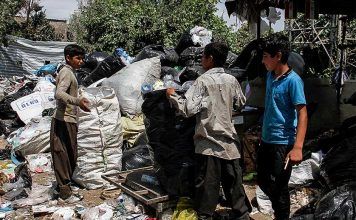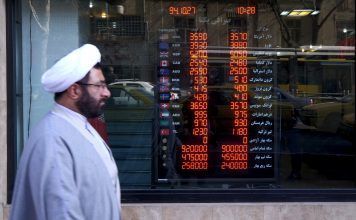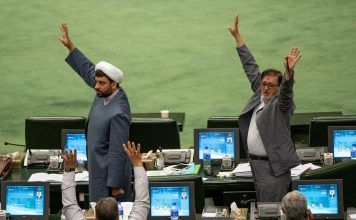By Reza Hamidi
Some Iranians have taken advantage of the government’s low official foreign-exchange rate to pay their home mortgages in Canada, Abdolnaser Hemmati, the Governor of the Islamic Republic Central Bank, has said.
[aesop_image img=”https://kayhanlife.com/wp-content/uploads/2018/07/Iran-Central-bank.jpeg” panorama=”off” credit=”FILE PHOTO: A general view of the Central Bank of Iran building in Tehran. REUTERS/Morteza Nikoubazl” alt=”FILE PHOTO: A general view of the Central Bank of Iran building in Tehran. REUTERS/Morteza Nikoubazl” align=”center” lightbox=”off” captionsrc=”custom” captionposition=”left” revealfx=”off” overlay_revealfx=”off”]
Mr. Hemmati made the comments during an open session of the Majlis (Iranian Parliament).
“We are using a scientific method to stabilize the foreign exchange market [Forex]. In the past, we injected foreign currency into the market to stabilize the exchange rate,” Mr. Hemmati was quoted by the Iranian Students News Agency (ISNA) as saying. “We have pumped $280 billion into the market in the past 15 years. That is more than $18 billion a year. The measure was aimed at controlling inflation and the currency.”
[aesop_image img=”https://kayhanlife.com/wp-content/uploads/2018/04/2016-01-17T120000Z_1356110889_GF20000097644_RTRMADP_3_IRAN-NUCLEAR-ECONOMY.jpg” panorama=”off” credit=”FILE PHOTO: A cleric walks past a currency exchange shop in Tehran’s business district, Iran. REUTERS/Raheb Homavandi/TIMAATTENTION EDITORS – THIS IMAGE WAS PROVIDED BY A THIRD PARTY. FOR EDITORIAL USE ONLY.” alt=”FILE PHOTO: A cleric walks past a currency exchange shop in Tehran’s business district, Iran. REUTERS/Raheb Homavandi/TIMAATTENTION EDITORS – THIS IMAGE WAS PROVIDED BY A THIRD PARTY. FOR EDITORIAL USE ONLY.” align=”center” lightbox=”off” captionsrc=”custom” captionposition=”left” revealfx=”off” overlay_revealfx=”off”]
“The low exchange rate and nepotism have made it easy for foreign currency to leave the country in the form of investment,” Hemmati explained. “When we eventually put a stop to it, many of the people involved in the scheme complained that they could not make their monthly [mortgage] payments in Canada and other places. They admitted to holding savings deposits that paid up to 25 percent interest, and were paying a low rate of 42,000 or 35,000 rials to a dollar. which enabled them to make their monthly [mortgage] payments in foreign countries.”
“We were effectively subsidizing people who were buying homes abroad,” Hemmati noted. “Starting in 2018, we changed our methods. We intervened and stabilized the market. The Central Bank has poured no dollars into the market in the past two years. We have instead bought $1 billion during that period.”
Speaking about other measures taken by his office to reform banking policies, Hemmati said: “We have no choice but to reform the relationship between the government and the Central Bank. The money supply and inflation have respectively increased by 25 percent and 20 percent on average for the past 50 years. The money supply has risen by 27 percent in the last decade.”
“The relationship between the government and the Central Bank has been the principal reason for the increase of the money supply,” Hemmati explained. “We must reform the government’s incomings and outgoings as it relates to the Central Bank. President [Hassan Rouhani] said a few days ago that the government did not plan to tap into the Central Bank’s cash reserves.”
“We will control inflation and the money supply by reforming banking inequalities, and hope that the government will stop tapping into the Central Bank’s cash reserves,” Hemmati added. “The government’s budget deficit should be the basis for the money supply increase. The government and the Central Bank are in agreement on this point, and we have already started the process. A few days ago, we kicked off of the first phase by selling [Islamic] treasury bonds, which is the best solution, especially when the government faces a shortage of liquidity.”
Speaking at the Majlis’ open session on the same day, Javad Karimi Ghodoosi, a deputy representing Mashhad, capital of the northeastern province of Khorasan Razavi, criticized the government of President Hassan Rouhani for having failed to submit the banking reform bill to the Majlis in the past eight years.
Mr. Ghodoosi said: “In 2017, the National Security and Foreign Policy Committee of the Majlis asked officials at the Central Bank, the Ministry of Intelligence, the Intelligence Organization of the Islamic Revolutionary Guards Corps (IRGC), the Ministry of Finance and the Central Headquarters for Combating Commodity and Currency Smuggling to find out why the value of the national currency had dropped drastically, and why the treasury was empty.”
“The President ordered Mr. Seifi, the governor of the Central Bank in 2017, to pump $36.1 into the market within three years,” Ghodoosi added. “However, the money, along with 80 tons of gold, ended up in the hands of a criminal gang dealing in foreign currency, golds, and drugs, and eventually turned up in the Iraqi city of Sulaymaniyah, which is under the control of the U.S. and Saudi Arabia.”
This article was translated and adapted from Persian by Fardine Hamidi.





